Search
Showing 10 of 6400 results
-
New international education strategy for Te Pūkenga
Chief Executive Stephen Town says the strategy supports a high-quality, sustainable education offering focused on ākonga (learner) experience and wellbeing.
“We have a unique opportunity to move from a model of competition to an integrated and collaborative approach, with a single brand, tailored to international markets and a single strategy aligned with the Government’s International Education Strategy,” Mr Town says.
The strategy aims to create more pathways to global citizenship, diversifying markets and creating high value for learners, employers and community.
The strategy is aligned with the New Zealand International Education Strategy and has five key areas of focus:
- creating and supporting skilled and culturally competent global ākonga
- adding significant value to the Aotearoa New Zealand community
- aligning learning outcomes to the needs of employers
- creating valuable strategic partnerships within and outside of Aotearoa New Zealand
- giving expression to our Te Tiriti o Waitangi relationship that exists between the Crown and Māori to improve outcomes for Māori through delivering partnership, protection, participation, and equity.
Te Pūkenga - New Zealand Institute of Skills and Technology - is Aotearoa New Zealand’s largest tertiary institution and one of the largest providers of tertiary education in the world. Established in 2020, Te Pūkenga is bringing together the country’s Institutes of Technology and Polytechnics (ITPs) and Industry Training Organisations (ITOs) to create a network of on-the-job, on campus, online, and offshore learning opportunities through a unified network.
-
Report from GHEDEX 2022
This year saw a welcome return to an in-person event, attracting good numbers of students and international education stakeholders. ENZ showcased New Zealand as an education partner for Oman during the “Quality in Higher Education” conference that took place alongside GHEDEX. While in Muscat, ENZ also hosted an event for Omani alumni of New Zealand universities. Twenty-eight attended, from seven universities, providing a useful networking opportunity.
Officials at GHEDEX confirmed that as our border is reopening, New Zealand is included in the just-released Omani Ministry of Higher Education’s 2022/23 handbook for scholarships. Feedback from education agents suggests that fewer scholarship students overall are expected this year.
Dr Nadia Kasto, New Zealand Academic Advisor for the Omani Consulate-General in Melbourne confirmed that from next year, all Omani scholarship students will be able to make their own decisions about the country and university that best suit their study needs.
“All universities have to work very hard to promote themselves to Omani students in order to get as many students as they can.”
-
Latest insights on international education
The Insight Story March 2022 is the latest snapshot of international education from Education New Zealand Manapou ki te Ao.
This fourth issue includes research, insights and trends on:
• our top source markets
• other English-speaking international student destinations
• student visa numbers
• international student experiences
• transitions from secondary to tertiary study in four priority Asian markets.
Do you know, for example, which countries are most interested in our Study with New Zealand website?
Or how students from Japan rate the value for money and cost of living in New Zealand, and their overall experience here?
Or which nationalities have the highest number of student visas granted in other English-speaking international education markets?
Or how positively international students rate their experience in New Zealand, and how international student experience at New Zealand universities compares with the global benchmark?
To find the answers to these questions and more, read The Insight Story and sign up for future issues, on the IntelliLab website.
-
Kōrerorero on quality education
Panellists included
- Dr Dawn Freshwater, Vice-Chancellor at the University of Auckland, who is also the first woman to hold this role
- Dr Sandra Regina Goulart Almeida, Vice-Chancellor at the Federal University of Minas Gerais (UFMG) in Brazil
- Dr Alejandro Ceballos, Vice-Chancellor at the Universidad de Caldas in Colombia.
With simultaneous interpretation in Spanish and Portuguese, the session attracted more than 100 attendees and 350 registrations from across Latin America and Aotearoa New Zealand. Panellists shared their thoughts on gender equality, integration, and inclusion, and how to achieve more equitable access to quality education. They also discussed the main priorities and focus of their institution in relation to SDG 4, and how they overcome challenges to achieve the SDG’s objectives.
Education New Zealand Manapou ki te Ao’s Kōrerorero webinar series is intended for academics, education agents and media in Latin America and New Zealand. It has been particularly effective in maintaining awareness of a New Zealand education while our borders are closed, while also contributing to discussions on important matters related to international education. Across the six episodes since its launch in 2020, more than 1,000 people have attended, with many subsequent views on YouTube.
If you would like to watch this episode, please click here
-
Strong start for Cohort 4 international students
Already more than 3,500 international students have been nominated by their education providers and confirmed by education agencies. More than 1,900 of these students have had their Request for Travel approved and have been invited by Immigration New Zealand to apply for their student visas, since the process opened on 13 April 2022.
Places remain available for students with a number of ELS and PTE providers. Only education providers can nominate students for this cohort. Interested international students or their agents should contact ELS or PTEs as soon as possible. Of the 5,000 places in this cohort, 1,000 were allocated to ELS and 850 to PTEs, with the remainder going to universities, Te Pūkenga, and secondary schools.
Once they have been nominated by an education provider and confirmed by education agencies, students have two weeks to make their Request for Travel through the Immigration New Zealand website. Following approval of the Request for Travel, students then have one month to complete and submit a student visa application to Immigration New Zealand, in time for a mid-year start for their studies.
Education providers are due to complete their nominations by 6 May 2022. Any unused places will be transferred to other providers, which means that some providers may get additional places as part of the reallocation process.
This is the fourth cohort of international students to be granted a border exception to enter New Zealand and is part of the progressive reopening of our borders. All visa categories are due to reopen from October 2022 onwards, including visitor and student visas.
For more information on this cohort of international students, see Cohort 4 » Education NZ (enz.govt.nz)
-
New advisory board to support our North American strategy
Established by Education New Zealand Manapou ki te Ao in 2021, this voluntary advisory board includes former Study Abroad scholarship winners to New Zealand, independent education counsellors, and senior leaders in international education in the United States. Members have a shared interest in developing educational ties between the US and NZ and are supporting ENZ’s North America team to implement our strategy for this market.
The 10-member board has established three sub-committees that will develop signature projects to raise awareness of New Zealand’s education brand and promote student flow between the two countries. The sub-committees cover:
- Alumni engagement and student experience: Three board members were former students in New Zealand and discussed ways in which ENZ and institutions could better support international students before, during, and after their study experience in New Zealand.
- State consortia engagement: The United States is vast and decentralised. This sub-committee is advising and assisting with partnership development around State-run education consortia that, in some States, oversee international education initiatives from Kindergarten through PhD-level Colleges and Universities.
- Foundation engagement: In the US, grants, research and special projects are largely funded by foundations set up by companies and individuals. Sub-committee members will use their expertise and networks to help identify foundations whose interests align with ENZ’s and New Zealand’s education and economic goals to set up funded partnerships between the two countries.
The overall aim of this work is to:
- position New Zealand as a destination of choice for students from diverse backgrounds by promoting and changing the understood narrative of New Zealand
- identify and develop strategic, reciprocal partnerships that align with our goals
- evaluate aspects of our programming and outreach related to:
- diversity, equity, and inclusion (DEI)
- student care
- help the ENZ North America team determine how we translate and explain Māori values to North American audiences, how they relate to our work, and how they can contribute to the field of international education
- provide a North American context to international education including but not limited to study abroad, full degree, exchange, and hybrid learning.
DEI is a core part of ENZ’s North American strategy for international education. We hope to move beyond perceptions of New Zealand as a country suitable for adventure seekers, to position New Zealand as a diverse country with a strong bicultural heritage, rich ideals of social justice, and an ideal education destination for students from marginalised backgrounds.
-
Delegation promotes NZ in Japan
Arrangement with Japan Women’s University
An Education Cooperation Arrangement with Japan Women’s University (JWU) was signed on 22 April by Dr Ryoko Imaichi, Chancellor, Japan Women’s University Educational Corporation, and Grant McPherson on behalf of Education New Zealand Manapou ki te Ao. The Prime Minister was also present and spoke at the event.
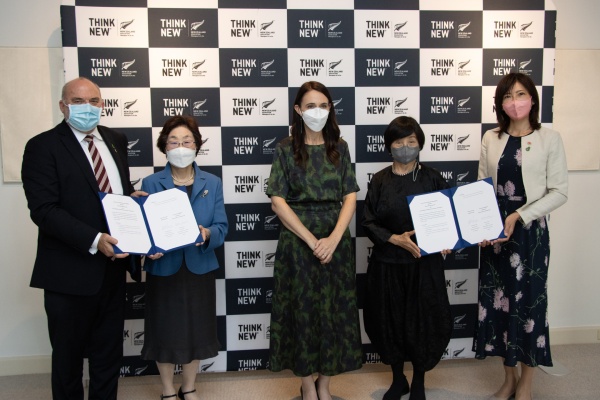
Image above: From left, Grant McPherson, ENZ, Dr Ryoko Imaichi, Chancellor, Japan Women’s University Educational Corporation, Prime Minister Jacinda Ardern, Professor Satoko Shinohara, President, Japan Women’s University, Misa Kitaoka, Director of Education – Japan, ENZ
The partnership with JWU will see more students from the university and its four affiliated schools come to study in New Zealand. Eleven university and school students from the JWU network attended the signing ceremony and spoke with the Prime Minister about their pre-COVID 19 experiences travelling to New Zealand.
This event came shortly after the Prime Minister met with her former homestay sister from over 30 years ago. The homestay sister also attended the signing ceremony, where the Prime Minister spoke about her personal experience of international education, including hosting homestay students in New Zealand and studying abroad at Arizona State University.
“Like Japan, New Zealand is a long island nation from north to south, and while being influenced by diverse cultures, I deeply sympathize with the historical background that has led to the present. Moreover, the current New Zealand society, which embodies world-leading sustainability, should be a great learning experience for our students,” Professor Satoko Shinohara, President of Japan Women’s University, said.
In Japan, there is a strong focus on the United Nation’s Sustainable Development Goals at the national and institutional level. Gender equality has received more emphasis in recent years and the new arrangement is timely for many reasons, as New Zealand and Japan focus on reconnecting to look towards the future.
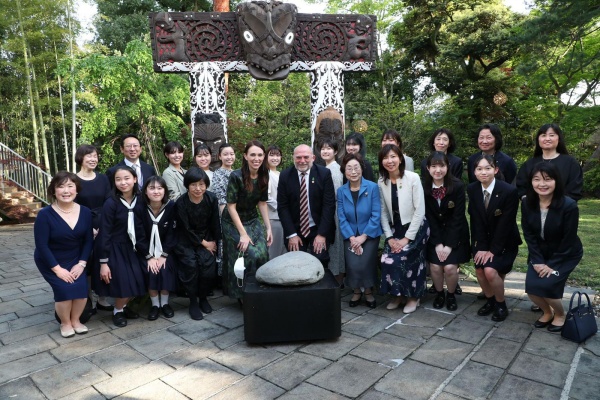
Relaunch of Game On English
The Prime Minister, alongside the President of Fonterra Japan, Yasuhiro Saito, and the Commissioner from Japan Sports Agency, Mr Koji Murofushi, relaunched the Game On English programme that had been paused due to COVID-19. The 2022 phase of Game On will see female rugby players travel to Hamilton to study English and receive high-performance rugby training, sponsored by Fonterra.
Originally launched in 2014, during former Japanese Prime Minister Abe’s visit to New Zealand, Game On English was an initiative that allowed New Zealand to support Japan’s efforts to lift international skills and English language capability while also supporting rugby skills development in the lead up to the Olympics and Rugby World Cup 2019. More than 195 female and male high school rugby players have visited New Zealand to participate in the three-to-four-week programme.
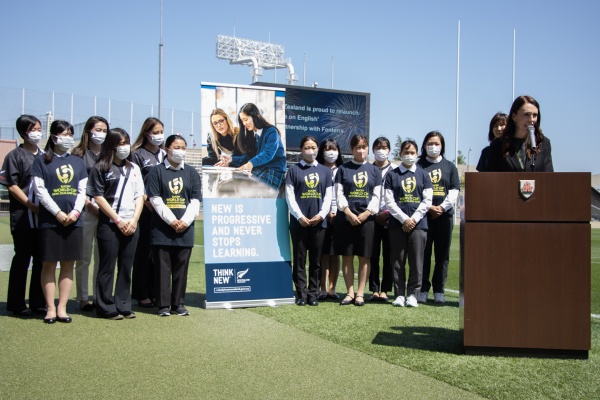
Image above: Prime Minister Ardern speaks at Chichibuya Stadium in Tokyo on 22 April 2022 to support the relaunch of Game On English for female rugby players to study English and receive rugby training.
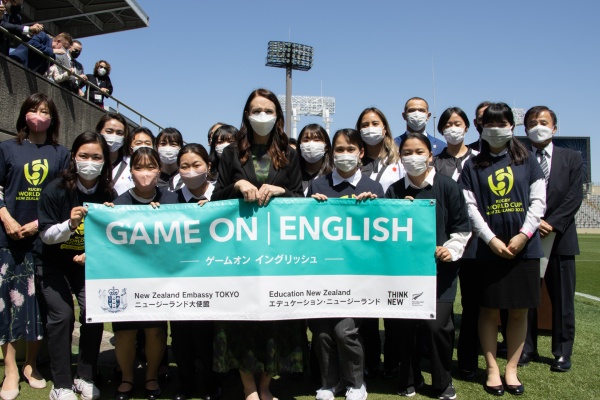
Working Holiday Scheme students
Former Working Holiday Scheme participants from Japan were invited to an event held at Cookie Time Harajuku (Tokyo) store. Several students spoke about their work or study experience, and a recurring theme was how New Zealand changed their life. Working Holiday visa holders from any country can study for up to six months while on a working holiday visa in New Zealand.
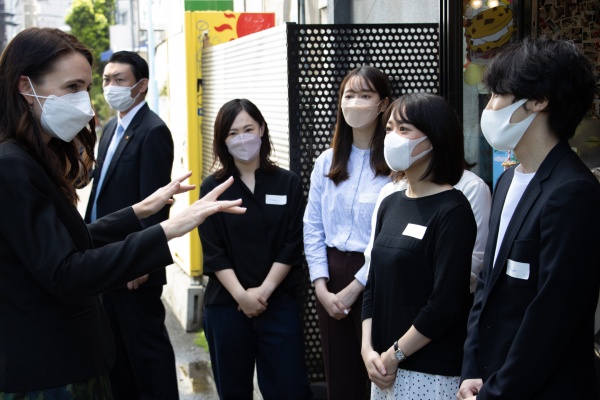
Image above: Prime Minister Ardern speaks to former working holiday visa holders about their work and study in New Zealand.
There has been extensive media coverage of all three events in Japan, including via national newspapers and TV stations. This coverage will support ENZ’s promotional activities before the New Zealand border reopens on 2 May 2022 to short-term students from Japan, as a visa-waiver country.
-
Upcoming offshore events related to international education – April 2022
Dates
Event
Location
8 - 11 May
International Conference & Exhibition for Education (ICEE)
Organised by the Saudi Ministry of Education, the conference has this year opened to wider participation. ENZ will host a pavilion with New Zealand universities, English language schools, and EdTech companies.
Contact: Bronwyn Shanks
Riyadh, Saudi Arabia
16 – 18 May
IECA Spring Conference
The Independent Educational Consultants Association (IECA) is a not-for-profit, international professional association representing experienced independent educational consultants. ENZ plans to attend to develop networks of IECs.
Contact: Lewis Gibson
North America
22 May
Study with New Zealand Virtual Fair
A co-funded virtual exhibition between ENZ and one of our ENZRAs in Viet Nam, IDP. The online session will promote New Zealand as a high-quality study destination and offers an opportunity for New Zealand institutions to communicate directly with potential students and parents.
Contact: Van Banh
Viet Nam
29 May, 4, 5 June
Code Camps – Future Proof Interactive series
A series of five code camps for Vietnamese school students, in a collaboration between ENZ and Code Avengers. The aim is to promote New Zealand’s future-proof education.
Contact: Van Banh
Viet Nam
31 May – 3 June
NAFSA: Association of International Educators annual conference 2022
This is the largest international education conference in the world, and this year’s theme is 'Building Our Sustainable Future'.
Contact: Lewis Gibson
Denver, Colorado, USA
13-16 September
European Association for International Education (EAIE)
EAIE is the largest business-to-business conference and international education event in Europe. This year’s theme is ‘The Future in Full Colour’. ENZ will host a pavilion with New Zealand universities and ITPs and run a networking event to engage with existing and new contacts face-to-face.
Contact: Olga Elli
Barcelona, Spain
14 – 15 September
Asia Pacific Technical Vocational Education and Training (APAC TVET) Forum
A partnership between ENZ, Te Pūkenga and Skills Consulting Group showcasing NZ vocational sector and its expertise. The forum will include academic and business-to-business/government-to-government elements, bringing together stakeholders across Asia and the Pacific to share expertise and capability.
Contact: Richard Kyle
Online –Asia and Pacific wide
21 – 29 October
China Education Expo (CEE)
Annual exhibition tour hosted by China Education Association for International Exchange (CEAIE) since 2000.
This major conference and expo is the leading international education event in China.
Contact: Jane Liu
Beijing, Guangzhou, Chengdu, Shanghai
-
Around the world in five – April E-News 2022
International
ENZ online education pilot extended
Education NZ to roll over Recognised Agency scheme to end of year
International learners stay cool on studying Down Under
Universities in ‘no mood’ to rush back to HE globalisation
New Zealand
International postgraduate students treated 'like massive drain on society'
Te Pukenga shares International Education Strategy
Financial hangover for Wintec, Waikato University as international students trickle back in
MIL-Evening Report: Open letter to Minister Faafoi – an appeal to help 34 abandoned Papuan students
Host families needed in Tauranga
Dunedin firm’s education tool a winner
India
Japan
New Zealand Relaunches Innovative Rugby and English Study Programme
Latin America
It's time to talk about educational quality at Education New Zealand's first Kōrerorero
Visions and perspectives on quality education in Latin America and Oceania
Saudi Arabia
South Korea
Thailand
Otago University New Zealand hybrid 2nd generation recruitment
Viet Nam
Opportunities for teachers to catch up with the wave of digital transformation in education
-
SIEBA launches Schools Global Citizenship Pilot Programme
A network of 20 schools will take part, receiving professional advice and support to create, introduce and embed global citizenship strategies and initiatives across their schools.
SIEBA’s recent report on international business recovery for schools highlighted global citizenship education as one of three key areas expected to underpin business recovery and the future of international education, both within New Zealand and globally. The other two areas are sustainability/climate action, and growth in school-to-university pathways.
Global citizenship programmes contribute to a better international student experience, build understanding and support for international education, and enrich the value proposition that schools offer both domestic and international students.
Image above: Japanese and Kiwi students discovering science together at Awatapu College in Palmerston North
“Global citizenship education (GCED) has the potential to bring local and international students together through a focus on global issues, and in development of global competencies. International students and parents are increasingly looking for schools that can demonstrably deliver GCED within the educational experience," the report says.
The pilot programme will be delivered in collaboration with the Centres of Asia-Pacific Excellence. The schools involved will draft Global Citizenship strategies linked to a range of programmes throughout the school, including learning content and teaching approaches, co-curricular programmes, professional learning and development, and student-led initiatives. They will examine how Te Tiriti o Waitangi and Te Ao Māori will underpin their global citizenship strategies. Schools will start local, this will be a multi-year journey, and the result will look different in every school.
Developing global citizens is also one of the overarching goals of the New Zealand International Education Strategy.


